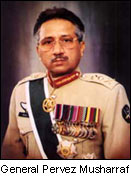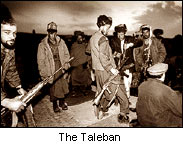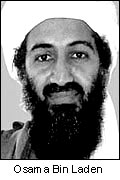The Rediff Special/ B Raman



The US authorities seem to be increasingly focussing, inter alia, on the likely involvement of Osama bin Laden's set-up in the terrorist incidents on
September 11, which President George Bush described on Thursday as the beginning of the first war of the new millennium.
Bush expressed the US determination to fight this war till victory is won; NATO countries and Russia have expressed their solidarity with the US in this matter. The support of India, the greatest victim of Pakistan and Afghanistan-based international Islamic terrorism, would be natural.
As part of the US's counter-offensive to make the world safe from international Islamic terrorism,
Bush has, through Colin Powell, his secretary of state, and Wendy Chamberlin, the US ambassador in Islamabad, sought Pakistan's co-operation. General Pervez Musharraf has given a public assurance of
his 'unstinted co-operation' against international terrorism. Bush told the media on September 13 that the US 'has given Pakistan a chance to co-operate,' thereby indicating some scepticism in his mind whether the military junta would do so and, if so, to what extent.
 On the basis of present evidence, unless there has been a miraculous change in Musharraf's real attitude, his co-operation would, most probably, be more proforma than real, for the following reasons:
On the basis of present evidence, unless there has been a miraculous change in Musharraf's real attitude, his co-operation would, most probably, be more proforma than real, for the following reasons:
The strong personal and professional links between Musharraf and Lieutenant General Mohammad Aziz, the clandestine chief of staff of Pakistan's Army of Islam, on the one side and bin Laden on the other. These bonds date from the Afghan war of the 1980s. The Army of Islam consists of bin Laden's Al Qaeda, the Harkat-ul Mujahideen, the Lashkar-e-Tayiba, the Jaish-e-Mohammad and the Al Badr.
The equally strong bonds of these officers with the Taleban, which was created during Benazir Bhutto's second tenure. These two officers, who were then posted as director general of military operations and deputy director general of the Inter Services Intelligence respectively, created the Taleban at the instance of retired Major General Nasirullah Babar, Benazir's interior minister, who was himself the head of the ISI's Afghan division under her father.
The way Musharraf and Aziz frustrated Nawaz Sharif, after his return from Washington in July 1999, to co-operate with the US on the bin Laden issue.
The fears entertained by them and by fundamentalist sections of the Pakistan army and Islamic organisations in Pakistan that the end of bin Laden's set-up and the Taleban could mark the beginning of the end of the so-called jehad in Jammu & Kashmir.
Fears of an Islamic fundamentalist backlash against Musharraf if he is perceived as co-operating with the US against the Taleban and bin Laden.
Ever since his appointment as chief of army staff in October 1998, Musharraf has been proclaiming himself as strongly against international terrorism, but he has repeatedly excluded from this the terrorist activities of the so-called jehadis in J&K, the Taleban and bin Laden's set-up. He has never condemned or even criticised, however mildly, the terrorist activities of the Taleban and bin Laden's set-up by name.
 If the US and other NATO powers really want their counter-offensive to triumph, they have to work for the replacement from power in Islamabad of Musharraf, Lt Gen Muzaffar Usmani, his deputy chief of the army staff, Lt Gen Aziz, presently a corps commander at Lahore, and, possibly, Lt Gen Mahmood
Ahmed, the ISI's director general, by moderate officers, who would be genuinely responsive to the concerns of the world community and sincere in their commitment to co-operate in the fight against international Islamic terrorism.
If the US and other NATO powers really want their counter-offensive to triumph, they have to work for the replacement from power in Islamabad of Musharraf, Lt Gen Muzaffar Usmani, his deputy chief of the army staff, Lt Gen Aziz, presently a corps commander at Lahore, and, possibly, Lt Gen Mahmood
Ahmed, the ISI's director general, by moderate officers, who would be genuinely responsive to the concerns of the world community and sincere in their commitment to co-operate in the fight against international Islamic terrorism.
For this purpose, the US has to identify officers with no past links with bin Laden and the Taleban. India might be able to help in this regard. Unless this is done, Musharraf and his coterie, while
seemingly co-operating with the US and the rest of the world community, would covertly work against their counter-offensive. So long as this coterie continues in power, the chances of a definitive success of the counter-offensive would be doubtful.
In this connection, it is necessary to recall what the Nation (January 8, 1999) reported, quoting Western (apparently US) diplomatic sources in Islamabad: 'The world continues to believe that Pakistan is backing the Taleban hook, line and sinker and some of its institutions have also links with Osama. The support continues through linkages established over the years. We believe this support is much more than moral and diplomatic. It is also material and financial.
'While we believe the Nawaz Sharif government's assurances that it has nothing to do with Osama, we suspect that part of the Pakistani establishment is involved with the man. The prime minister and his confidants have done much to clear suspicions that they are backing Osama. Many responsible federal ministers have assured us in private that Pakistan will never be a party to his activities and that it condemns terrorism.
'But, at the same time, they also tell us that there are wheels within wheels which they cannot stop and which continue to have truck with Osama besides rendering valuable material support to the Taleban. There is a vast network in your (Pakistani) intelligence community which does not listen to any government and which operates on its own. It is definitely happening in the case of the Taleban and Osama as well. We know it.'
 This position continues to be as valid today as it was in January 1999. Musharraf and his coterie constituted this wheel within wheels under Nawaz Sharif and continue to maintain their networking with the Taleban and bin Laden.
This position continues to be as valid today as it was in January 1999. Musharraf and his coterie constituted this wheel within wheels under Nawaz Sharif and continue to maintain their networking with the Taleban and bin Laden.
Amongst other first steps the US should take are:
Demand that the junta immediately bans the Pakistan-based Harkat-ul Mujahideen, which is a member of bin Laden's International Islamic Front For Jehad Against the US and Israel and which was declared by the US as a terrorist organisation in October,1997, arrests its leaders and winds up its training camps. The Nawaz Sharif as well as the Musharraf regimes have avoided action against the HUM.
Identify the officers in the army and ISI who are mixed up with the Taleban and bin Laden's set-up and demand their removal as the first Clinton Administration had demanded the removal of Lt Gen Javed Nasir, then DG, ISI, and many of its officers, who were sympathetic to the Arab terrorists in Afghanistan and frustrated US efforts to buy back the Stingers.
Demand the arrest and expulsion to their country of origin of the remnants of the Arab mercenaries of the Afghan war, who are still present in Pakistan, even if they have been given Pakistani nationality.
Demand the immediate posting of a much stronger team of UN monitors than originally envisaged near the Pakistan-Afghanistan border to prevent Pakistani violations of the UN sanctions.
Stop all bilateral and multilateral credits and other assistance to Pakistan till it shows signs of sincerity in co-operating with the world community.
The international Islamic terrorist syndicate's brain trust advising bin Laden in Afghanistan are:
Sheikh Taseer Abdullah, who is also known as Abu Hafs al-Misri. He could be the same person whom the FBI describes as Mohammed Atef, bin Laden's military commander. Washington has charged Atef with involvement in the Kenya and Tanzania bombings and announced a reward of US $ 5 million for his capture. Sheikh Taseer was constantly at bin Laden's side -- whether it was in Peshawar and Afghanistan in the 1980s, in the Sudan subsequently and again in Afghanistan after bin Laden's return from Sudan in May 1996.
Sheikh Taseer, who dresses in the Afghan salwar-kameez like bin Laden and is bearded and turbaned, is a former Egyptian police officer. He came to Peshawar in 1983 and started participating in the Afghan jehad. He was amongst the first Arabs to have responded to the call of the Afghan mujahideen for foreign volunteers and was instrumental in persuading many other Arabs to join the jehad. He joined the jehad even before bin Laden, the late Sheikh Abdullah Azzam and Sheikh Omar Abdel-Rahman, the Egyptian cleric now in jail in the US.
Sheikh Taseer is also credited with persuading Azzam to resign his job as a lecturer in Islamabad's Islamic University and join the jehad. Azzam shifted to Peshawar and built up a vast network to help the Afghan refugees and arrange for the training of the Arab mercenaries and their subsequent induction into the jehad.
Dr Ayman al-Zawahiri, of Egypt's Al Jihad, whose grandfather Abdul Wahab used to be Egypt's ambassador to Pakistan. The bespectacled al-Zawahiri and his family have been living in Afghanistan for the last 18 years.
Two sons of Sheikh Omar, Mohammad, 29, and Abu Asim. Their real names are not known.
Abu Yasir Rifai Ahmed Taha (real name not known), another Egyptian.
Shawki al-Islambouli, brother of Khalid Islambouli, who killed President Anwar Sadat. His presence is rumoured about, but not confirmed.
Bin Laden's own organisation in Afghanistan is dominated by Saudis, Yemenis and Egyptians, with a
small number of Algerians, Tunisians, Libyans, Syrians, Jordanians, Palestinians and Iraqis. The organisation, which bin Laden heads, is called Al Qaeda (the Base or the Centre) and its military wing the 055 Brigade. The Brigade has a strength of about 300, all Arabs of Afghan war vintage. Bin Laden's International Islamic Front consists of the following organisations:
Al Qaeda
The Jamatul Jihad of Egypt led by Dr al-Zawahiri
Another Egyptian group led by Abu Asim
A third Egyptian group led by al-Islambouli (unconfirmed)
The Harkat-ul Mujahideen of Pakistan
The Lashkar-e-Tayiba of Pakistan
The Sipah-e-Sahaba of Pakistan, an extremist Sunni organisation which has been campaigning for the
proclamation of Pakistan as a Sunni State
The Harkat-ul-Jihad-al-Islami, which is believed to be another name for Al Qaeda. This is not confirmed, hence, it is shown as a separate organisation
The Islamic Movement of Uzbekistan led by Jumma Namangani
The Hizb-e-Islami Turkistan, also led by Namangani
The Abu Sayyaf group of the Southern Philippines
An organisation (name not known) of the Uighurs of Xinjiang in China
The Taleban
All these organisations have their own separate objectives. Al Qaeda fights for the overthrow of
the Saudi monarchy and for the withdrawal of the US and British troops from Saudi Arabia. The Egyptian groups want Islamic rule in their country. The Harkat and Lashkar want the merger of J&K with Pakistan and, subsequently, the 'liberation' of Muslims in other parts of India. The Sipah-e-Sahaba wants a Sunni State in Pakistan and the declaration of the Shias as non-Muslims. The Uzbek group wants an Islamic State and the Turkistan group wants an Islamic Federation of all
Central Asian republics and Xinjiang. The Uighurs want independence.
The members of the Front help each other in their operations and look upon the US and Israel as their common enemies.
The proposed global counter-offensive against international Islamic terrorism has to recognise the
following ground realities:
It will not be a one-shot war of limited duration over after a few spectacular air strikes and commando actions. The International Islamic Front has its presence in at least 20 countries. Only about 10 per cent of its hard core is in Afghanistan. The rest are spread all over the world. They would, therefore, be in a position to retaliate in the most unexpected places in the most unpredictable manner.
Those who join the counter-offensive should show grit and consistency in carrying it through till final victory instead of developing cold feet when faced with huge casualties and infrastructure damage in their respective countries at the hands of the terrorists.
Any unfortunate perception amongst the Muslims of the world that the counter-offensive is anti-Islam and not anti-international Islamic terrorism would be counter-productive.
Any counter-offensive plan should have the following components:
A community of the intelligence agencies of the countries joining this counter-offensive for joint
intelligence collection, sharing, analysis and operations.
Mutual co-operation and assistance in strengthening the physical security of vital/sensitive infrastructure, air travel, etc.
Political, economic and diplomatic isolation of Pakistan, the Taleban and any other country
assisting international Islamic terrorism, for whatever reason.
Carefully worked out and precisely-targeted deniable covert actions against the terrorist groups and their leaders. One should avoid spectacular overt actions against them, which would be counter-productive.
Public pressure for spectacular reprisals should be resisted.
In the 1950s and the 1960s, when a large number of democracies in the Western as well as the non-aligned worlds were faced with armed Communist insurgencies sponsored by Moscow and Beijing, all the affected countries fought this menace jointly through a mix of overt and covert actions in a discreet, non-spectacular manner. That is the model to be emulated after updating it, where necessary.
B Raman, retired additional secretary, Cabinet Secretariat, is currently, director, Institute For Topical Studies, Madras.
Design:Lynette Menezes
Also see:
Terrorism in America: The complete coverage
The Rediff Specials